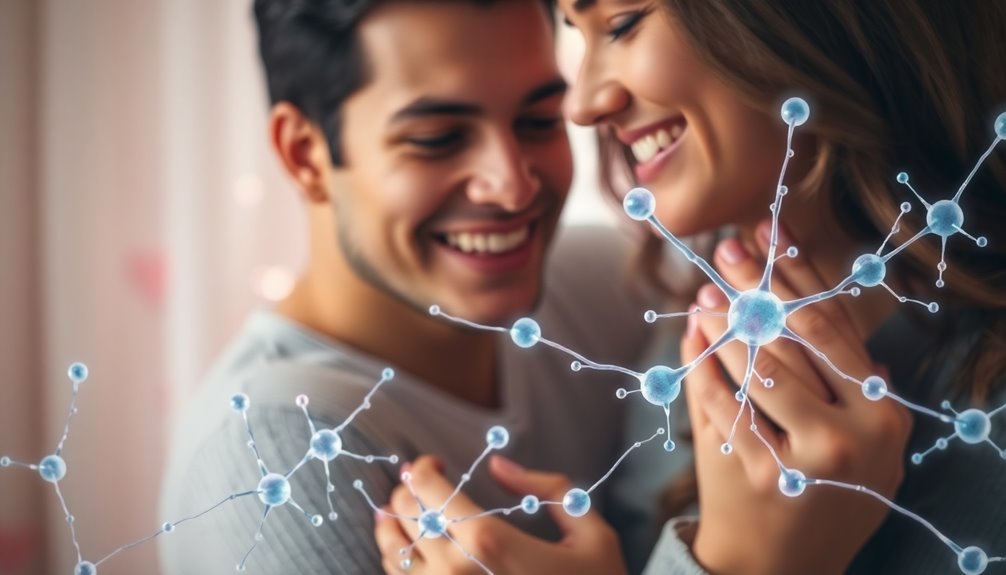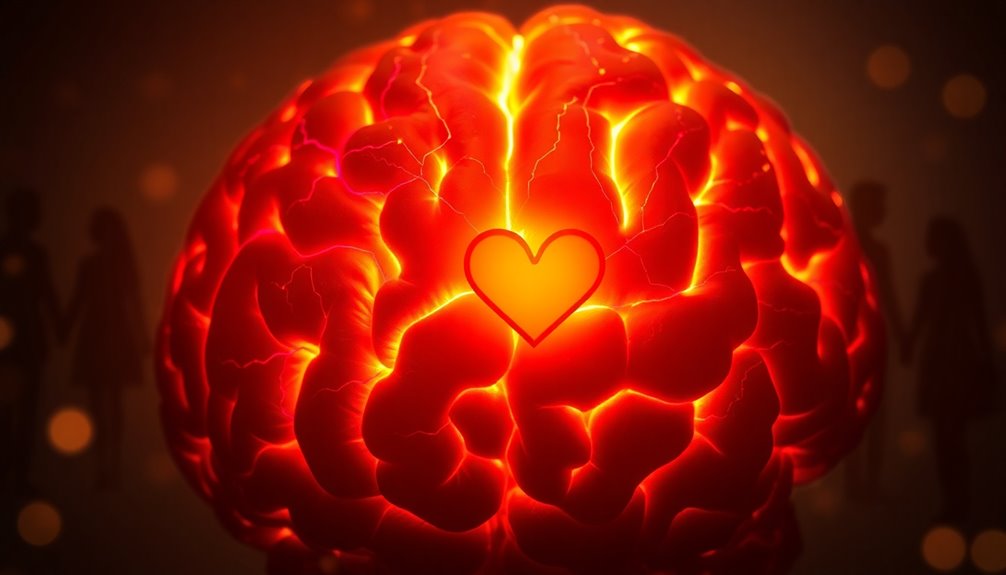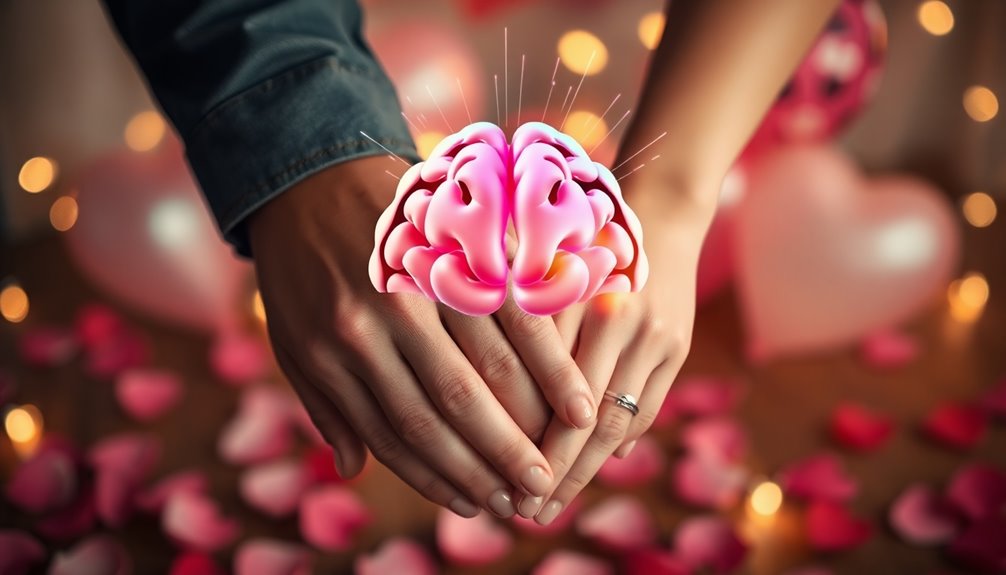After Valentine's Day, your brain experiences emotional shifts due to changes in neurotransmitter levels. While dopamine boosts pleasure and motivation, oxytocin fosters bonding during intimate moments. However, as oxytocin drops, you might feel lonely or disappointed. Stress can heighten your cortisol, straining relationships. These chemical fluctuations can profoundly affect your emotions and connections. Understanding these changes can help you navigate the aftermath of love celebrations, revealing more about the intricate science behind your feelings.
Key Takeaways
- Post-Valentine's Day, oxytocin levels may drop, leading to feelings of loneliness or disappointment in relationships.
- Emotional highs from Valentine's can contrast sharply with post-holiday lows, impacting overall mood.
- Stress and elevated cortisol from Valentine's Day can disrupt emotional connections and intimacy between couples.
- Reassessment of relationships often occurs after Valentine's Day, potentially resulting in breakups or renewed commitment.
- Long-term romantic love can enhance emotional bonds but requires consistent interaction to maintain neurotransmitter balance in the brain.
The Chemical Cocktail of Love

When you experience the thrill of falling in love, your brain is busy releasing a powerful mix of neurotransmitters that create those exhilarating feelings of attraction and joy.
Dopamine acts as a reward signal, heightening your pleasure and motivation to pursue your partner. As serotonin levels fluctuate, you might feel euphoric yet slightly obsessive, a sign of your brain's intense focus on this new connection.
Oxytocin, the "love hormone," kicks in during bonding moments, deepening emotional ties and fostering a sense of security. Meanwhile, norepinephrine spikes, causing physical reactions like a racing heart.
This chemical cocktail not only enhances your feelings but also rewires your brain, laying the groundwork for lasting attachments and profound emotional connections. Transformational talks can also inspire personal growth and deeper connections in relationships.
Emotional Highs and Lows Post-Valentine's Day

After the intoxicating rush of love's chemical cocktail, the days following Valentine's Day can bring unexpected emotional shifts.
You might find yourself riding a rollercoaster of emotional highs and lows. That surge of oxytocin, which created feelings of closeness, can quickly fade, leaving a void.
When the excitement wears off, you could feel a sense of loneliness or disappointment, especially if expectations weren't met. Increased cortisol levels from the stress of the day may also dampen your mood.
In addition, it's common for couples to reassess their relationships in the aftermath, leading to breakups. Emotional dysregulation can exacerbate feelings of confusion and frustration as partners navigate the aftermath of the holiday.
As the euphoria dissipates, your brain and body might struggle to regain balance, highlighting the stark contrast between that blissful day and the emotional reality that follows.
The Role of Neurotransmitters in Relationships

Understanding the role of neurotransmitters in relationships reveals how these chemical messengers shape our emotional experiences.
Dopamine plays a key role in creating initial attraction, surging during your first interactions with potential partners. This neurotransmitter boosts your mood and encourages deeper connections through positive social cues.
Meanwhile, oxytocin, known as the "bonding hormone," enhances emotional attachment and satisfaction, solidifying long-term relationships.
When positive experiences occur, your dopamine levels increase, prompting you to engage more with others.
However, insufficient oxytocin can make it tough for connections to thrive.
It's clear that a balanced release of these neurotransmitters is essential for relationship stability, ensuring your emotional bonds remain strong and fulfilling. Establishing healthy boundaries can further enhance the effectiveness of these emotional connections.
Stress and Its Impact on Love

Stress can undermine the very foundation of love, as it often leads to a cascade of negative emotions that strain relationships. Around high-pressure events like Valentine's Day, the pressure to meet expectations can heighten anxiety and hinder emotional connections. Increased cortisol levels disrupt the rewarding signals that strengthen emotional bonds between partners, making it harder to maintain intimacy. Prolonged exposure to stress rewires your emotional responses, further complicating the ability to nurture long-term connections. When relationships formed during low-stress periods face significant stress, they can deteriorate rapidly. This highlights the importance of a supportive environment, as managing stress effectively is vital for preserving the health and stability of your emotional bonds in love. Additionally, engaging in mindfulness practices can enhance self-awareness and help couples reconnect amid stressful situations.
Long-term Effects of Romantic Love on the Brain

While many people think of love as a fleeting emotion, long-term romantic love profoundly shapes the brain, fostering lasting chemical changes that enhance emotional connections.
In stable relationships, the ongoing release of oxytocin and dopamine reinforces your bond, leading to increased happiness. This activation of the brain's reward system mirrors addiction patterns, providing continuous pleasure from your partner.
Additionally, the emotional support you receive can boost your immune function and overall health. As initial stress levels decrease, you gain emotional stability, making it easier to handle life's challenges.
The consistent interaction in long-term relationships strengthens neural pathways, enhancing your empathy, communication, and emotional regulation skills over time. Furthermore, unconditional love contributes to a secure emotional environment, allowing for deeper connections and personal growth.
Ultimately, love becomes a powerful force for personal growth and well-being.
Frequently Asked Questions
How Does Valentine's Day Affect the Brain?
Valentine's Day can really impact your brain. When you engage in romantic activities or receive gifts, your brain releases dopamine and serotonin, boosting your happiness.
Bonding experiences trigger oxytocin, enhancing your emotional connections. Positive interactions reinforce your brain's reward system, potentially leading to lasting emotional bonds.
Even simple gestures can release endorphins, improving your mood. So, whether you're celebrating love or friendship, the day can elevate your emotional well-being considerably.
What Effect Does Love Have on the Brain?
Love sparks excitement, ignites joy, and transforms your brain. When you're in love, your brain releases dopamine, flooding you with pleasure and euphoria. This surge strengthens your attachment, making you feel more connected.
Oxytocin enhances your bond through physical touch, deepening your emotional security. However, stress can disrupt this balance, leading to emotional turmoil.
Embracing love means embracing a whirlwind of neural changes that shape your relationships and your happiness.
What Happens Scientifically When You Fall in Love?
When you fall in love, your brain releases a rush of chemicals like dopamine and norepinephrine, making you feel euphoric and excited.
As the attraction deepens, oxytocin kicks in, fostering emotional bonding.
You might notice a dip in serotonin, leading to anxious or obsessive thoughts.
Initially, your brain's reward system goes into overdrive, reinforcing your connection.
Eventually, these intense feelings stabilize, allowing for deeper emotional intimacy within a few months.
What Happens to a Man's Brain When He Falls in Love?
When you fall in love, it's like stepping into a Shakespearean play, where passion ignites the stage. Your brain floods with dopamine, making you feel euphoric, while norepinephrine speeds up your heart and sharpens your senses.
As oxytocin weaves its magic, you feel a deep bond. Yet, with decreased serotonin, anxiety and obsessive thoughts can creep in, blurring the lines between bliss and obsession.
Your caution fades, and all you see is her.
Conclusion
As Valentine's Day fades, you might feel a rollercoaster of emotions, but remember, love's chemistry lingers long after the flowers wilt. Your brain has danced with dopamine, oxytocin, and serotonin, shaping your bonds in profound ways. Embrace the highs and lows; they're part of love's beautiful madness. After all, isn't it the thrill of connection that keeps you craving more? So, let love's science guide you through the ups and downs of your romantic journey.









